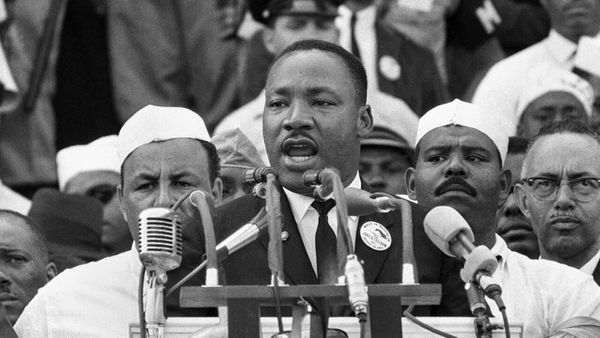WASHINGTON — In late December of 2020, the heiress to the Publix grocery store chain was eager to volunteer millions of dollars in support of a rally in the nation’s capital on the day that Congress was to certify the results of the presidential election, according to text messages revealed in a transcript from the Jan. 6 Select Committee. But she may not have gotten what she paid for.
Julie Fancelli wanted Roger Stone and Alex Jones, two firebrand supporters of then-President Donald Trump’s campaign to overturn the 2020 election results, to speak at the planned rally on the White House Ellipse that ultimately preceded the violent march on the U.S. Capitol. She paid for a private plane that transported Stone from Florida to Washington for the event, according to documents revealed in her deposition.
But neither Stone nor Jones addressed the crowd. Instead, according to the committee, nearly $200,000 of Fancelli’s proffered $3 million commitment was provided as commission to Caroline Wren, a former top fundraiser for the Trump campaign, for securing the money. Another $60,000 went to Kimberly Guilfoyle, partner of Donald Trump, Jr., for speaking for three minutes before the rally.
The 132-page transcript shows Fancelli, Guilfoyle, Wren and others in frequent communication over the event from mid-December through Jan. 6, when a mob of Trump’s supporters stormed the Capitol attempting to thwart Congress from certifying the election results. The deposition transcript was released Wednesday by the House’s Jan. 6 Committee along with dozens of others following the committee’s final meeting and ahead of the release of its full investigative report.
The exchanges include messages that promote the “Stop the Steal” movement and highlight Congress’ role in certifying Joe Biden’s victory that day, leading the Jan. 6 committee to question whether Fancelli knew whether she was funding an effort to thwart the peaceful transfer of power.
Fancelli invoked various provisions of the U.S. Constitution in response to most of the committee’s questions. But she did acknowledge that her company had cooperated with the committee, submitting all documentation of her donations to the rally, and said that her intent was for the event to be peaceful.
At the time of her Feb. 18 deposition, she said she had not been contacted by federal investigators.
Attempts to reach Fancelli on Thursday were unsuccessful.
While a text message from Wren to Charlie Kirk, founder and executive director of Turning Point USA, shows that Fancelli originally offered to wire all $3 million to his organization at once, she ultimately broke up the donation into several transfers to multiple groups that were involved in the event.
One $150,000 donation went to the Rule of Law Defense Fund, which produced a Jan. 5 robocall to supporters encouraging them to “march to the Capitol Building and call on Congress to stop the steal.”
Since news broke of Fancelli’s involvement in funding the Jan. 6 rally, Publix has distanced itself from the heiress, writing in previous statements that Fancelli “is not an employee of Publix Super Markets, and is neither involved in our business operations, nor does she represent the company in any way.”
“The violence at the Capitol on Jan. 6 was a national tragedy,” the supermarket chain previously wrote in a statement. “The deplorable actions that occurred that day do not represent the values, work or opinions of Publix Super Markets.”
Fancelli has made political contributions on the local level as well, donating $50,000 to the Mom’s for Liberty PAC to fund Florida School Board races earlier this year.
‘She’s ready to invest’
In the days leading up to Jan. 6, Fancelli’s correspondence with Wren showed her dedication to busing young people into Washington for the rally.
Wren first connected Kirk to Fancelli via text message. On Dec. 15, 2020, according to the transcripts, Wren tried to arrange a meeting between Kirk and Fancelli at Turning Point’s upcoming Student Action Summit in West Palm Beach, Fla.
“Do you know Julie Fancelli? Heir to Publix. She’s given Trump $2 million,” Wren writes to Kirk. “I just spoke to her and she LOVES YOU (listens to all your podcasts) and she’s going to come Thursday-Sunday for SAS. I need wire transfer info, I was going to send you $50k today and then if you need to meet with her for 5 mins at some point she would do minimum $250k guaranteed.”
Then on Dec. 26, 2020, the day after Christmas, Fancelli appeared enthusiastic about donating. Wren, visiting Fancelli’s home, texted Kirk.
“I’m actually sitting with her now,” Wren writes. “Are you all doing any sort of effort to bring folks out to D.C. for January 6th protests? Call me if you can. She’s ready to invest.”
That same day, Wren texted with Taylor Budowich, a current spokesman for Trump who worked on the Jan. 6 rally at the time.
“I’m at Julie Fancelli’s,” Wren writes to Budowich. “Guess what the budget is she just gave me for our bus project?”
“You won’t guess,” she continues. “$3 million…”
“Lololol,” Budowich says, “probably could do it for 3.”
“She wanted to just wire me the 3 mill lol,” Wren says.
“Rich people are so odd,” Budowich replies.
Fancelli initially donated $1 million to Kirk’s efforts. But in the days leading up to the rally, she sent him an additional $250,000, according to the transcripts.
The deposition shows Fancelli also gave six-figure sums to Save the U.S. Senate PAC, Women for America First and the State Tea Party Express, among others.
Wren ultimately told Fancelli that 75 buses were used during the rally to increase turnout – highlighting to the Jan. 6 committee Fancelli’s interest in increasing the size of the crowd that day.
Fancelli would not answer the committee’s questions on what she wanted the rallygoers to do once they got there.
On Jan. 6, Fancelli contacted Wren multiple times for updates, reflecting for committee investigators her interest in how her money was being spent.
“Where are the buses with all of Charlie Kirks youth?” she writes. “Where does Rodger speak?”
“What is really happening?!” she asks Wren, at 1:50 pm.







